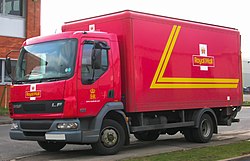| DAF XB (formerly DAF LF until 2023) | |
|---|---|
 2013 DAF LF | |
| Overview | |
| Manufacturer | DAF Trucks |
| Production | 2001-present (LF renamed to XB on October 6, 2023) |
| Assembly | UK: Leyland (Leyland Trucks) Taiwan: FASC Belgium: Ghent (Volvo Trucks) |
| Body and chassis | |
| Class | Small |
| Powertrain | |
| Engine | Cummins B Series engine (ISB3.9 & ISB5.9 in 2001-2006 models, ISB4.5 & ISB6.7 in 2007-present models) Cummins ISF3.8 (LF Hybrid) |
| Chronology | |
| Predecessor | DAF 45 & 55 Leyland Roadrunner |
| Successor | DAF XB |
The DAF XB (formerly DAF LF from 2001 to October 6, 2023) is a range of light/medium duty trucks produced by a Dutch manufacturer DAF Trucks. [1] It is a redevelopment from the Leyland Roadrunner of 1984.



